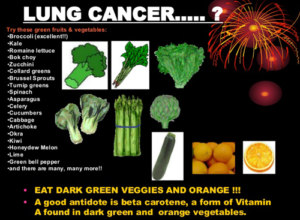Cancer. The word itself sends shivers down our spines. It’s the second leading cause of death globally, and lung cancer takes a particularly heavy toll. But here’s the good news: experts estimate that 30% to 50% of cancer deaths can be prevented through lifestyle changes, including a healthy diet.
This doesn’t mean there are magic “lung cancer fighting foods” that cure the disease. However, filling your plate with certain foods can give your body a powerful advantage in the fight against lung cancer.
So, ditch the fear and stock up on these good-for-you options!

Nature’s Antidote: The Power of Fruits and Vegetables
When it comes to lung cancer prevention, the vibrant world of fruits and vegetables takes center stage. They’re packed with antioxidants, those warrior molecules that combat free radicals – unstable molecules that damage cells and contribute to cancer development.
Here’s a breakdown of some all-star fruits and veggies:
- Rainbow Power: Think of your plate as a canvas. Fill it with a variety of colorful fruits and vegetables like apples, oranges, blackberries, blueberries, and pomegranates. These vibrant colors often signify a wealth of antioxidants, each offering unique benefits.
- Cruciferous Champions: Broccoli, cauliflower, Brussels sprouts, and cabbage are champions in the fight against cancer. They contain sulforaphane, a sulfur-rich compound that studies suggest may help prevent cancer cell growth.
- Tomatoes: The Lycopene Superstar: Don’t underestimate the humble tomato! Packed with the antioxidant lycopene, tomatoes may help reduce the risk of various cancers, including lung cancer.
- Leafy Green Goodness: Spinach, kale, and other leafy greens are nutritional powerhouses. They’re brimming with antioxidants, vitamins, and fiber, all contributing to overall health and potentially lowering cancer risk.
Fueling Your Body: The Role of Whole Grains
Lung cancer research suggests a link between nutritional deficiencies and the disease. Whole grains come to the rescue! They provide essential nutrients and fiber, keeping you feeling full and energized.
Here’s the key: Opt for whole grains like brown rice, quinoa, oats, and whole-wheat bread. Processed grains like white bread and white rice tend to be stripped of their nutrients, offering less health benefit.
Selecting the Right Fats: Plant-Based Power
While fried foods high in unhealthy fats may increase cancer risk, healthy fats from plants can be your allies. These fats provide essential nutrients and may even possess anti-inflammatory properties.
Load up on these good fats from sources like:
- Avocados
- Nuts and seeds
- Olive oil
- Vegetable oils
These plant-based fats not only give your meals a delicious flavor but also contribute to your overall well-being.
Building Strength: Protein’s Role in Healing
When undergoing cancer treatment, your body needs protein to rebuild and heal. But not all protein sources are created equal.
Focus on lean protein sources like:
- Skinless chicken and turkey
- Fish rich in omega-3 fatty acids like salmon
- Beans and lentils
While lean red meat can be part of a balanced diet, it’s best to consume it in moderation. Opt for cuts with less saturated fat to minimize inflammation.
A Watercress Wonder: A Specific Ally
For tobacco-related lung cancer, watercress deserves a special mention. This leafy green powerhouse contains phenethyl isothiocyanate, a specific oil that may be particularly effective against this type of lung cancer. It’s also rich in vitamin C, another powerful antioxidant that helps fight cell damage.
Beyond Food: A Holistic Approach
While a healthy diet is crucial, it’s just one piece of the puzzle. Here are some additional lifestyle factors that can significantly reduce your risk of lung cancer:
- Quitting Smoking: This is the single most important step. Smoking is the leading cause of lung cancer, and quitting significantly reduces your risk.
- Maintaining a Healthy Weight: Obesity is a risk factor for various cancers, including lung cancer.
- Regular Exercise: Aim for at least 150 minutes of moderate-intensity exercise or 75 minutes of vigorous-intensity exercise per week.
- Limiting Alcohol Consumption: Excessive alcohol consumption can increase your risk of lung cancer.
Remember: Knowledge is Power
While no single food can guarantee complete protection against lung cancer, a diet rich in fruits, vegetables, whole grains, healthy fats, and lean protein can significantly reduce your risk.
Empower yourself with knowledge! Talk to your doctor or a registered dietitian to create a personalized plan that incorporates these healthy choices into your lifestyle. Let food be your medicine, and fight lung cancer with every delicious bite!
Recommended Post:
